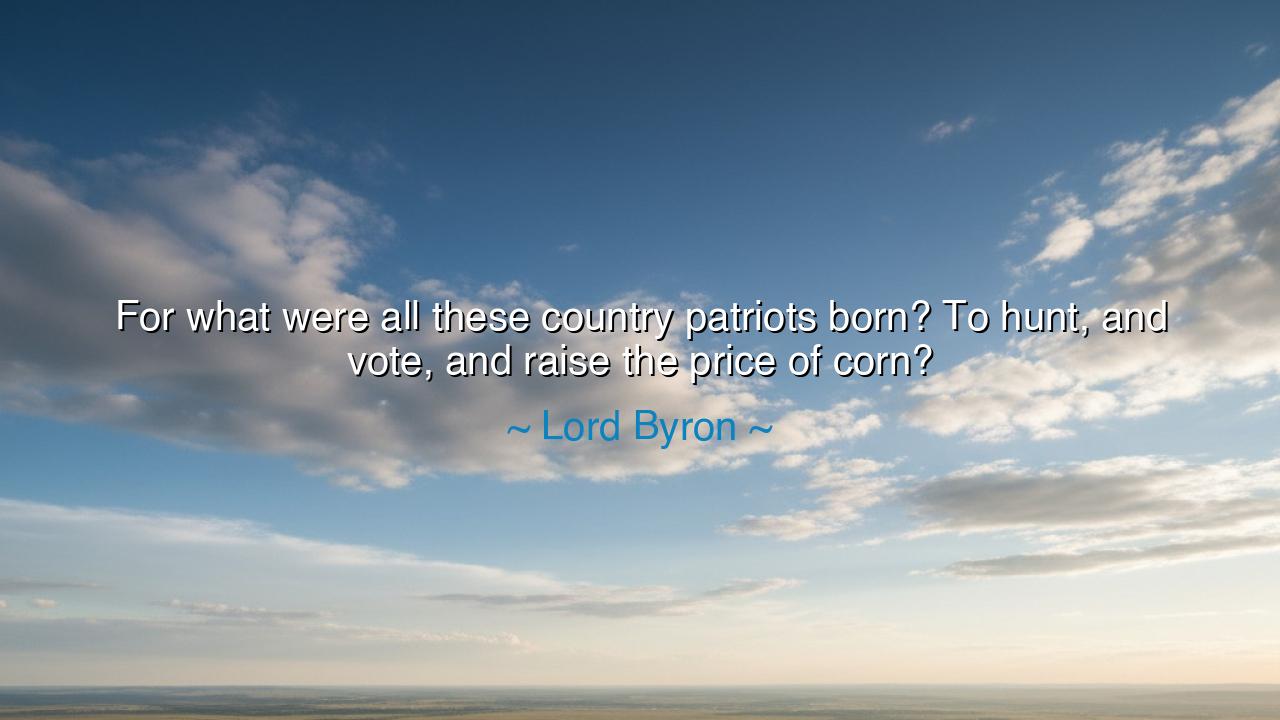
For what were all these country patriots born? To hunt, and
For what were all these country patriots born? To hunt, and vote, and raise the price of corn?






“For what were all these country patriots born? To hunt, and vote, and raise the price of corn?” Thus asked Lord Byron, with biting irony and the sharpness of a poet’s tongue. In this verse, he unmasks the hollowness of those who parade themselves as patriots, yet whose lives are bound not to noble duty or sacrifice, but to self-interest and petty gain. The question is rhetorical, for Byron knew well that the calling of a true patriot is higher than chasing game, casting votes for personal advantage, or manipulating markets for profit. His words burn like a lamp in the darkness, exposing the difference between false patriotism and the genuine devotion owed to one’s land.
The origin of this saying lies in Byron’s contempt for the political classes of his day. In England’s Parliament and countryside gentry, he saw men who called themselves guardians of the nation, but whose concerns were narrow and selfish. They spoke of love for country while using their power to enrich themselves—through land, trade, and the control of food prices. To Byron, such men were unworthy of the sacred title of patriot, for their loyalty was not to the people but to their own purses.
History is full of such pretenders. Consider the Corn Laws of early nineteenth-century Britain, which allowed landowners to inflate the price of grain at the expense of the common people. Cloaking themselves in the language of tradition and national interest, they defended their wealth while the poor starved. They posed as defenders of the realm, but their patriotism was a mask for greed. Byron’s words struck directly at this hypocrisy, condemning those who would exploit the name of loyalty to hide their corruption.
But the contrast between false and true patriots has always been visible. While some gentry enriched themselves, others gave all for their nations. Think of George Washington, who could have sought kingship but instead laid down power for the sake of the republic. He hunted, yes, but he also sacrificed, served, and endured hardship for the liberty of others. His patriotism was not self-serving, but self-giving. In him we see the antithesis of Byron’s scorn: a man who embodied the higher calling of loyalty to people, not profit.
The wisdom to pass down is this: beware those who cloak selfishness in noble words. The loudest cries of patriotism are sometimes uttered by those who think only of their own advantage. To discern true from false, one must look not to speeches, but to deeds. Does the man serve the common good, or only himself? Does he labor for justice, or merely for gain? Such questions separate the patriot from the pretender, the servant of the people from the exploiter of their trust.
The lesson for future generations is sharp and enduring: patriotism must never be reduced to shallow rituals or selfish pursuits. To hunt, to vote, to trade—these things may be good in themselves, but they are not the essence of love for country. True patriotism is sacrifice, service, and striving for the welfare of all. It is the willingness to bear burdens so that others may flourish. Without this spirit, the title of patriot is empty and unworthy.
Practically, this means rejecting the temptation to use love of country as a mask for personal ambition. Live your patriotism not in words alone, but in honest deeds: care for the poor, serve your community, defend justice, and place the needs of the many above the comfort of the few. Let your loyalty be measured not by what you gain, but by what you give.
So let Byron’s question echo through the generations: For what are patriots born? Not for hunting or hoarding, nor for profit or pride, but to serve, to sacrifice, and to preserve the higher ideals of liberty and justice. Let each who hears these words answer with their lives, proving by action that their patriotism is real, and worthy of remembrance.






AAdministratorAdministrator
Welcome, honored guests. Please leave a comment, we will respond soon